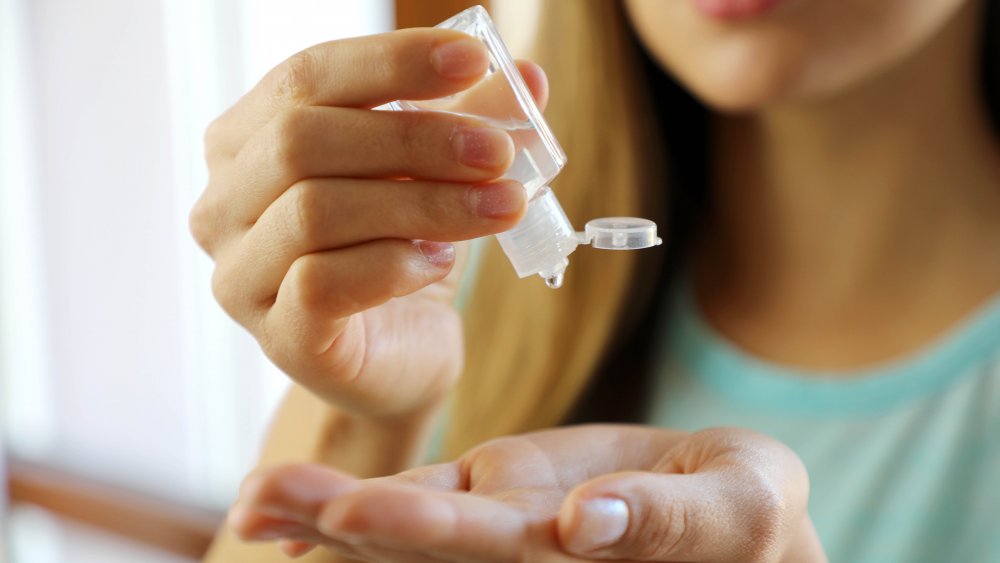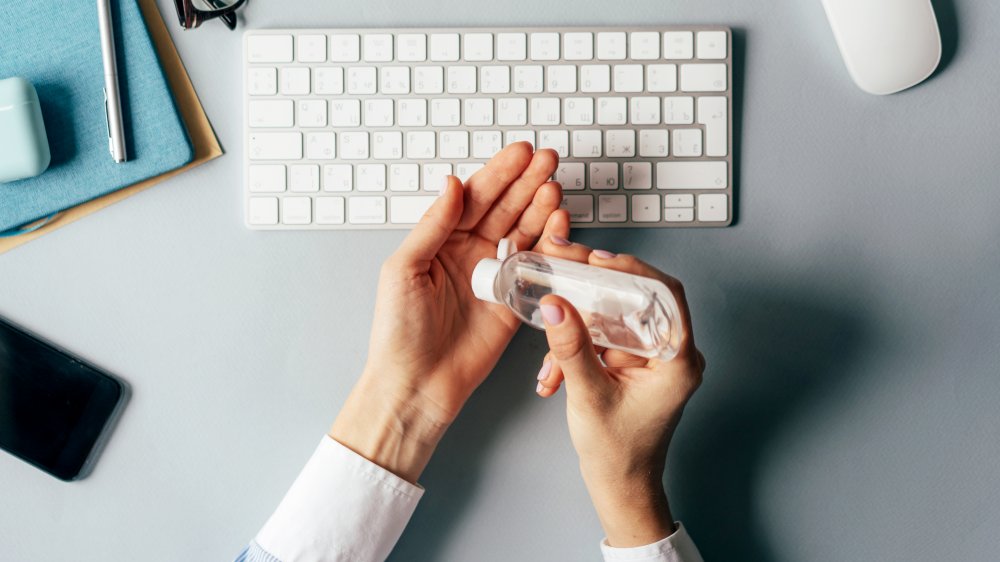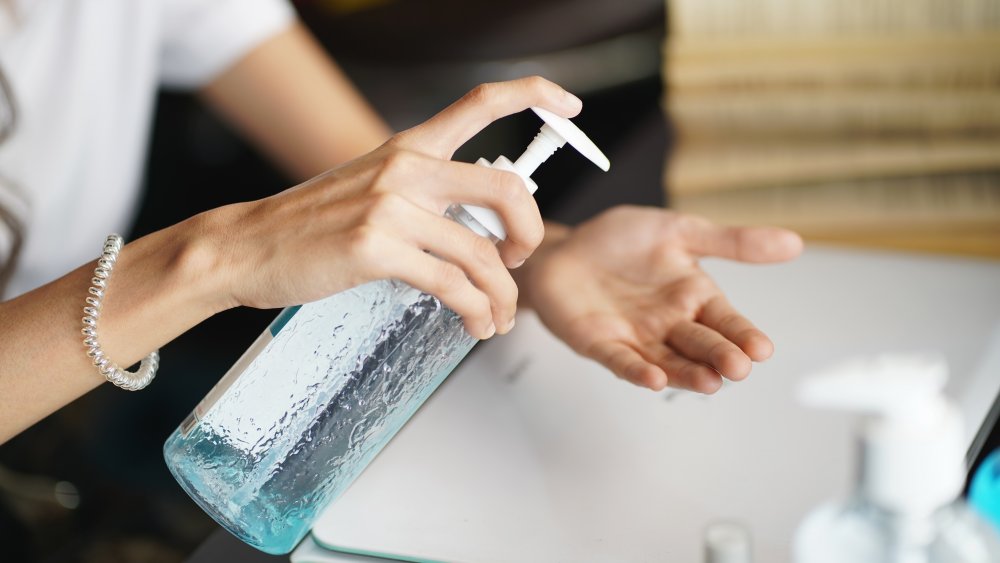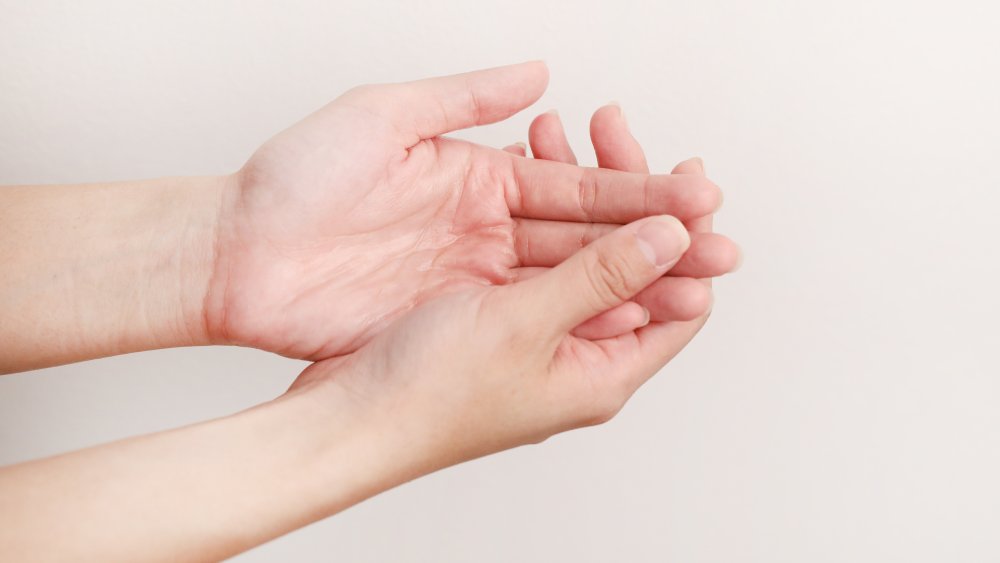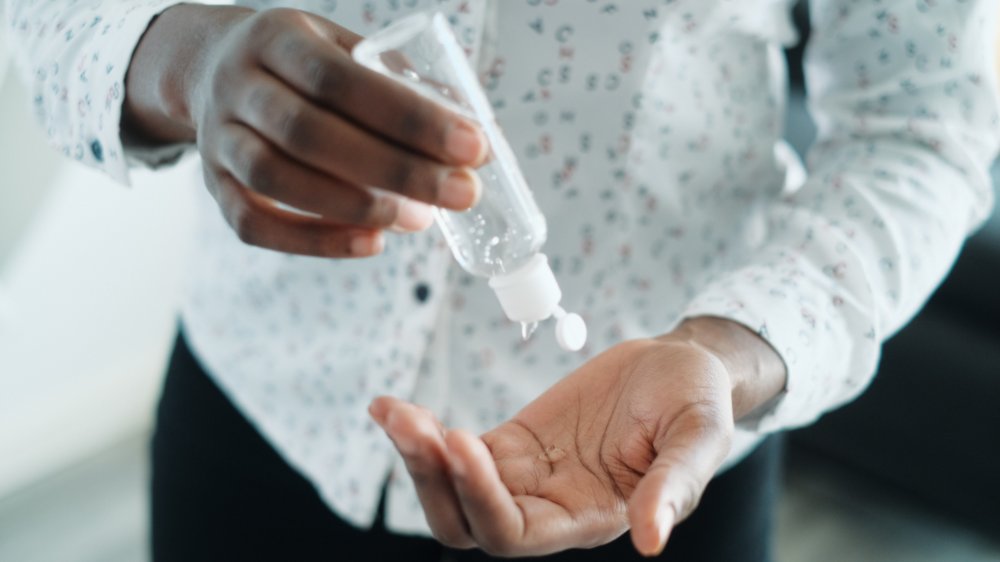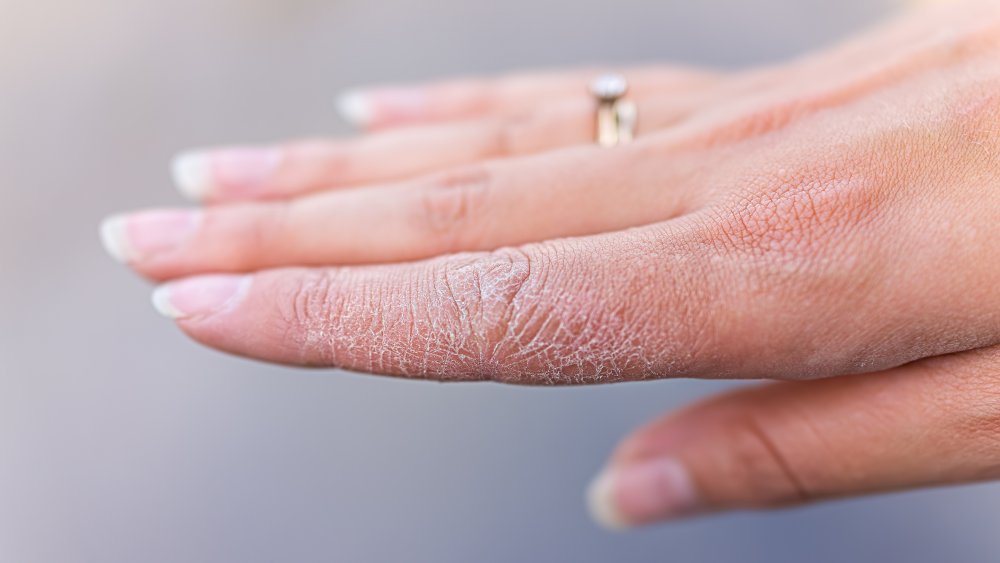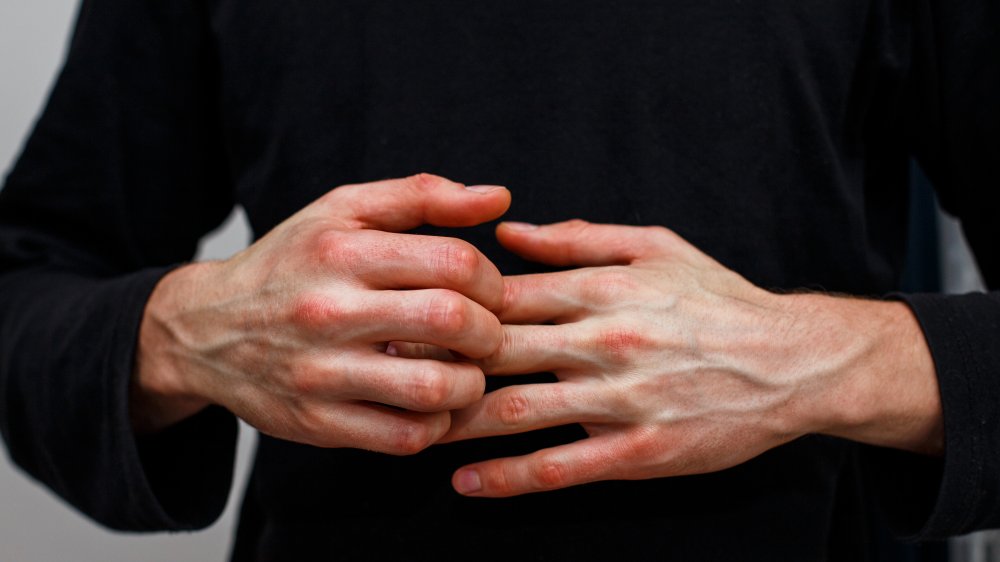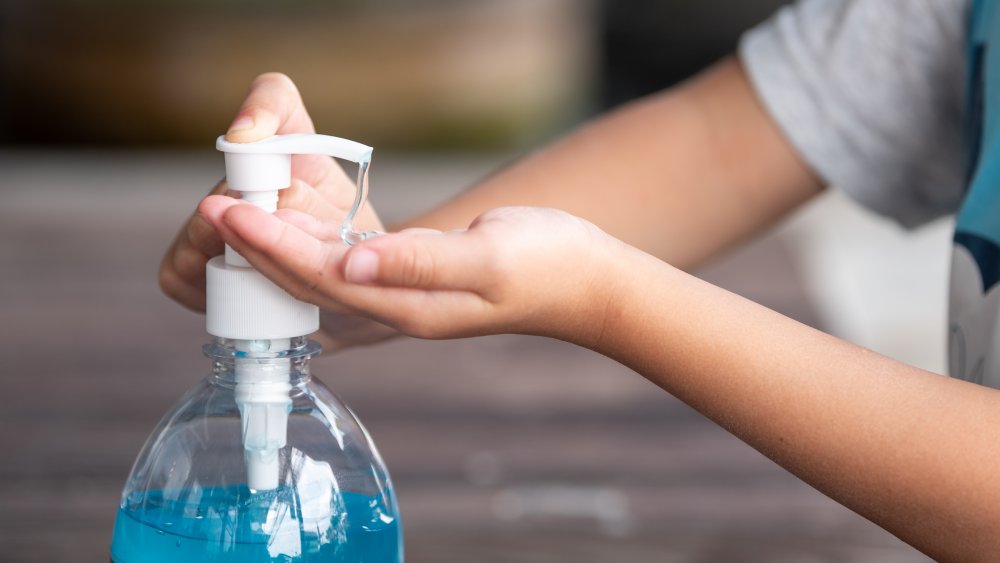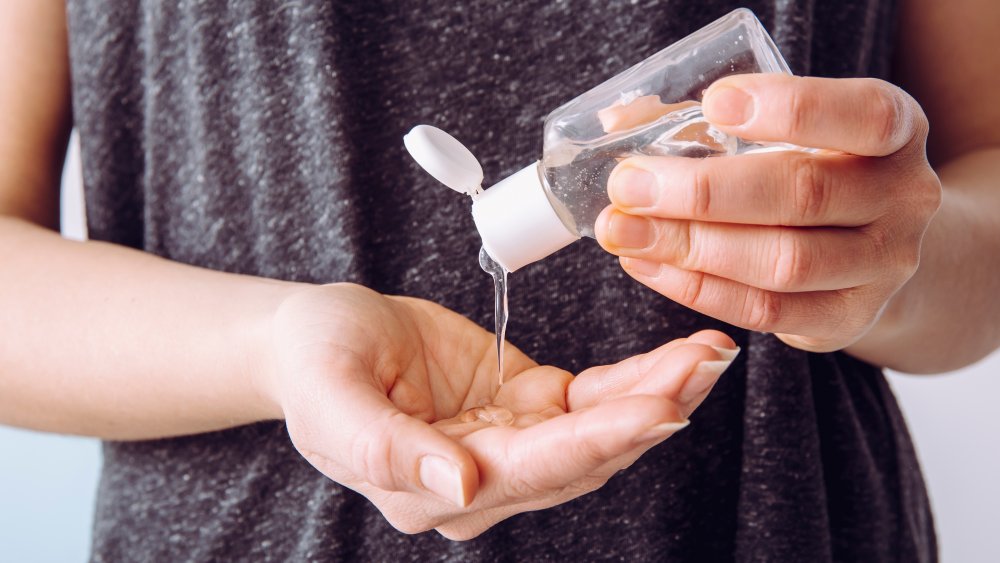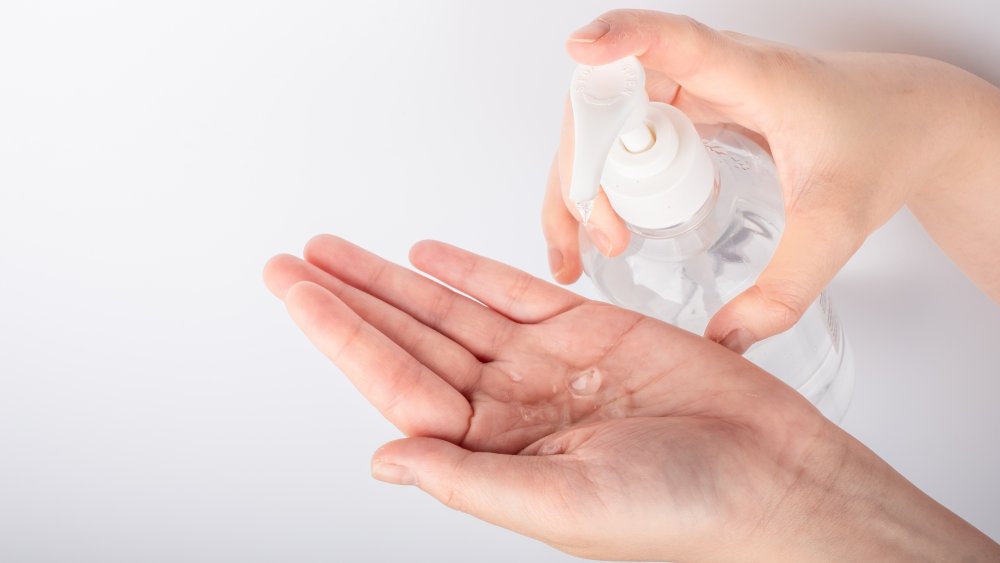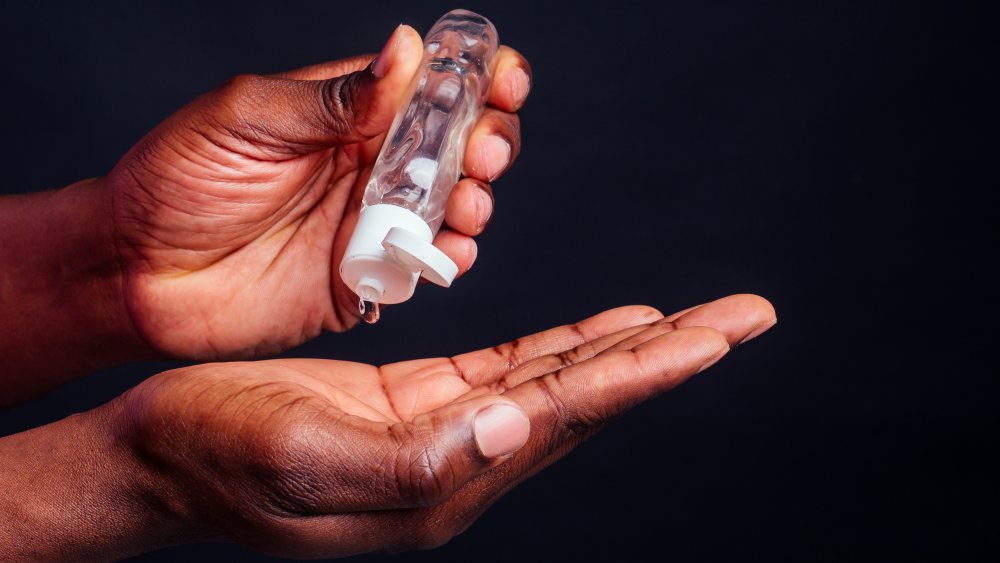When You Use Hand Sanitizer Every Day, This Is What Really Happens
Bottles of hand sanitizer began flying off the shelves by spring 2020. To prevent the spread of COVID-19, public health authorities such as the U.S. Food and Drug Administration, the Centers for Disease Control and Prevention, and the World Health Organization advised washing hands with soap and water for at least 20 seconds, especially after using the bathroom, before eating, and after coughing, sneezing, or blowing your nose. However, if soap and water are not readily available, the organizations recommend using an alcohol-based hand sanitizer containing at least 60 percent alcohol (aka ethanol).
Hand sanitizers recommended by these leading public health authorities for such purpose are always comprised of some combination of ethyl alcohol, isopropyl alcohol, and hydrogen peroxide. However, not every hand sanitizer sold out there meets the requirements of leading public health authorities. And even if you are using one that does, there are still consequences worth considering — especially if you're using the stuff on a daily basis. Here's a look at what really happens when you use hand sanitizer every day, according to the experts.
You'll kill some germs if you use hand sanitizer every day
Washing your hands with soap and water helps physically remove many kinds of germs that can linger on your skin, but rubbing hand sanitizer on your hands doesn't exactly remove all germs, the Centers for Disease Control and Prevention (CDC) revealed. Rather, hand sanitizer kills certain germs upon coming into contact with them. One of the germs that hand sanitizers is known to be effective against is, thankfully, the novel coronavirus. So if you are using hand sanitizer every day, you are, at least theoretically, able to kill any coronavirus germs that have ended up on your hands.
However, to do the job properly, hand sanitizer has to be made of at least 60 percent alcohol. Unfortunately, not all hand sanitizers have this ratio of alcohol. Additionally, hand sanitizer is not a cure-all; it's not effective at killing every germ out there, according to the CDC.
You could be wasting your money if you use hand sanitizer every day
"The thing that a lot of people don't seem to get is that it is not necessary to use hand sanitizer if you're already washing your hands whenever you should be," Dr. Leann Poston, an Ohio-based physician, told Health Digest. "Hand sanitizer is recommended as a substitute for hand washing when hand washing is not possible. It is not meant to be an extra precaution on top of hand washing."
If you're wondering right about now why hospitals stock up on hand sanitizer and make it available in all examining rooms, it is not because hand sanitizer offers better protection against the spread of germs than soap and water, but rather because hand sanitizer offers the ability to kill germs when hand washing is unavailable. Although you could say it is more efficient than washing with soap and water, it's not more effective.
You might be robbing yourself of the important benefits of soap and water if you use hand sanitizer every day
When asked if hand sanitizer is effective against COVID-19, the FDA made it abundantly clear that the best way to prevent the spread of infections and decrease the risk of getting sick is by washing your hands with "plain soap and water." And when they say "plain soap and water," they mean precisely that. "There is currently no evidence that consumer antiseptic wash products (also known as antibacterial soaps) are any more effective at preventing illness than washing with plain soap and water," the FDA explained. "In fact, some data suggests that antibacterial ingredients could do more harm than good in the long-term and more research is needed."
Further, soap and water is capable of removing certain organisms that hand sanitizers are either not consistently effective at killing or those which need to be removed as opposed to killed. These include Clostridioides difficile because it's impenetrable by alcohol, norovirus because it is enclosed within a protective "capsid" structure, and parasites such as Cryptosporidium because they are actual living organisms. Additionally, hand sanitizers do nothing to remove certain chemicals, pesticides, and heavy metals from the skin.
Hand sanitizer won't do much for you if you don't use it correctly
Just like soap and water, hand sanitizer must be used correctly to be effective, Dr. Leann Poston, an Ohio-based physician, told Health Digest. Correct use means applying enough to the hands to cover all the skin surfaces and then rubbing hands together until they feel dry, which should take around 20 seconds. This happens to be the same amount of time you'd be washing your hands with soap and water, Poston pointed out.
If you wipe off hand sanitizer before it has fully dried, it may not work as well against the germs, according to the CDC. In addition, the CDC cited a number of studies demonstrating that hand sanitizers work best on hands that are otherwise clean or only slightly soiled. This may explain why "hand sanitizers work well in clinical settings like hospitals, where hands come into contact with germs but generally are not heavily soiled or greasy," the CDC explained. The bottom line, according to Dr. Poston: If your hands are visibly dirty, your best bet is to wash them with soap and water.
Using hand sanitizer every day can rob your skin of good bacteria
One of the problems with hand sanitizer is that it does not distinguish between bad bacteria and good bacteria. So when you use hand sanitizer, you're not only killing the germs you want to kill, but you're also killing the bacteria that naturally lives on your skin and helps you to fight off harmful bacteria, Dr. Giuseppe Aragona, a general practitioner with PrescriptionDoctor.com, told Health Digest.
After many years of study, it is now well understood that good bacteria plays an important role in human health. According to a 2020 study published in the World Journal of Current Medical and Pharmaceutical Research, "excessive" use of hand sanitizer can create an imbalance of good and bad bacteria in the digestive system, potentially leading to inflammatory bowel diseases, obesity, and liver disease. Although it remains to be seen precisely how much is "excessive," it certainly appears that using hand sanitizer multiple times daily could be heading in that direction.
Using hand sanitizer every day could contribute to the development of superbugs
You know how your doctor always instructs you to finish an entire course of prescribed antibiotics, even if you feel better sooner? That's so the antibiotics have the chance to kill all the bacteria, and not just the weakest (and why would we want to leave the strongest bacteria behind?). You've likely also heard about "antibiotic resistance," which results from the overuse of antibiotics. Over time, antibiotics can lead to the development of antibiotic-resistant bacteria. And, unfortunately, antibiotics kill both good and bad bacteria.
These factors together explain why overuse of alcohol-based hand sanitizer can contribute to the development of superbugs that are resistant to antimicrobials. And that's not just a problem for you. It's a public health issue, according to one 2020 study. Or as the World Health Organization put it: "Antibiotic resistance is one of the biggest threats to global health, food security, and development today."
Your hands can become dry if you use hand sanitizer every day
You've probably noticed that using hand sanitizer even one time can leave the skin on your hands feeling more dry than usual. You will probably notice this even more if the antibacterial formula you've been using contains more than the minimum recommended amount of alcohol (60 percent). The reason is simple, Dr. Giuseppe Aragona, a general practitioner with PrescriptionDoctor.com, told Health Digest: "It's because alcohol is drying."
Furthermore, Dr. Aragona added, "If you use hand sanitizer multiple times daily, you'll exacerbate the dryness because you are by forcing your skin to absorb a lot of moisture, which stresses and stretches the skin and can lead to dryness on the skin' surface." Soap and water are drying too, so if you're using hand sanitizer on frequent hand washings, you're setting yourself up for uncomfortably dry skin on your hands.
Using hand sanitizer every day raises your chances of getting certain skin infections
Having dry skin on your hands is not just uncomfortable, Dr. Leann Poston, an Ohio-based physician, reminded Health Digest — it's also a setup for infection. Your skin forms a barrier between everything that is inside of your body and the outside world, she explained. When the skin is dry, it is more prone to cracking, and cracked skin offers germs an easy entry point into your body.
"Dry and damaged skin is [a] hotbed for many diseases causing bacteria with increased risk of virus entry into skin," a study in the journal Science of the Total Environment explained. But it's not just skin infections you're risking. Research has shown that overusing sanitizers can, in some cases, increase the risk of systemic viral outbreaks, including norovirus, according to that same study. If you're going to use hand sanitizer, the American Academy of Dermatology recommends applying "hand cream or ointment immediately after the hand sanitizer dries."
You risk skin irritation and rashes when using hand sanitizer every day
If dry skin and the various infections it can lead to aren't enough to inspire you to taper off a bit from your daily hand sanitizer habit, how about the fact that hand sanitizer can cause skin rashes, blistering, chemical sensitivities, or even allergies? Overuse of hand sanitizer is associated with dermatitis (inflammation of the skin), according to the Florida Skin Center. "Alcohol-based hand sanitizer can disturb the natural pH and barrier of the skin, leaving skin vulnerable to allergens which can penetrate beneath the surface and trigger an autoimmune reaction," the center revealed.
If you're thinking it's because of the harsh chemicals used in hand sanitizers, you're partly right. The other piece of the puzzle is that some of the inactive ingredients in hand sanitizer can cause skin irritation in some people. These can include phthalates, which are found in added fragrances, as well as natural extracts, such as tea tree oil.
Parents should exercise caution when using hand sanitizer every day
When used as intended (to kill germs on the skin of the hands), hand sanitizer poses no further risks to children than it poses for adults, according to the FDA. However, the FDA also recommends storing hand sanitizer out of the reach of children and never storing it in anything resembling a beverage or food container. For children under the age of six, hand sanitizer should only be used with adult supervision. This is for a few reasons: to ensure the child is using it properly, to encourage the child not to put their fingers in or near their eyes (which can cause eye irritation), and because hand sanitizer contains high enough levels of alcohol that it can result in alcohol poisoning if ingested by a child.
"Drinking only a small amount of hand sanitizer can cause alcohol poisoning in children," the FDA cautioned. "However, there is no need to be concerned if your children eat with or lick their hands after using hand sanitizer." If your child has ingested hand sanitizer, or if you have reason to believe that might have happened, the FDA advises calling poison control or a medical professional immediately.
Using hand sanitizer every day may be a fire hazard
If one of the reasons you're using hand sanitizer daily is that you think of it as nothing more than an alternative to soap, it's time to consider a major difference between soap and hand sanitizer: Unlike soap, hand sanitizer is flammable, according to the CDC. Accordingly, it's imperative that it be stored away from flame and heat. In addressing the safest ways to store and dispense hand sanitizer, the CDC reiterates that the percentage of alcohol that should be contained in a hand sanitizer is not only never less than 60 percent, but also never more than 95 percent.
If you're routinely rubbing hand sanitizer on your hands, you should also know that it doesn't take much hand sanitizer to react with heat or flame to start a fire. What's on your hands after applying hand sanitizer can catch fire if exposed to sparks, static electricity, or open flames. To help prevent fires, the CDC recommends rubbing hand sanitizer into hands until they feel completely dry and before continuing on to activities that might involve heat, sparks, static electricity, or flames.
Beware of chemical reactions when using hand sanitizer every day
Although you may not have given much thought to squeezing some hand sanitizer into your hands, there's something you should be aware of: Hand sanitizer can react with chemicals in ways you might not have expected. For example, in this study published in 2012 in the Journal of Occupational and Environmental Medicine, farm workers who used hand sanitizer more frequently were found to have more pesticides in their blood than farm workers who were exposed to the same levels of pesticides.
In addition, some chemicals should never be mixed with alcohol. That includes bleach. Bleach and rubbing alcohol, together, form the chemical chloroform — the fumes from which can be damaging to the eyes and skin. And if prolonged contact occurs, damage to the liver, kidneys, and nervous system is also possible. If you're using hand sanitizer on a daily basis, please do not slather it on before you plan to use any household products that contain bleach.
Your hand sanitizer may contain ingredients banned by the FDA
The FDA regulates hand sanitizers and has banned certain ingredients from being used in hand sanitizers. One such ingredient is triclosan, a chemical associated with hormone disruption. Fertility expert Dr. Zaher Merhi told Health Digest that this ingredient can impair fertility in both men and women. Another such ingredient is methanol, which is wood alcohol. Methanol should never be used in hand sanitizer because not only is it life-threatening when ingested, but it can also be toxic when absorbed through the skin.
Despite clear rules made by the FDA regarding the ingredients that can and cannot go into hand sanitizer, the FDA announced in August 2020 that it had seen a "sharp increase" in hand sanitizers that claim to contain none of the banned ingredients when, in actuality, they do. Accordingly, the FDA maintains a live database of hand sanitizers that are still using banned ingredients. It's always a good idea to check this list before purchasing hand sanitizer.
Using hand sanitizer every day may be safe, or it may not
Even before spring and summer 2020, the FDA had been investigating the longterm risks associated with daily use of hand sanitizers. In April 2019, the FDA made a final determination as to 28 chemicals that should not be included in hand sanitizer. These include triclosan, salicylic acid, and tea tree oil.
At the same time, the FDA acknowledged they still need more data regarding the safety and risks associated with the chemicals that are permitted in hand sanitizer. One of those ingredients is ethyl alcohol, which is the most commonly used ingredient in hand sanitizers, as of this writing, according to Dr. Janet Woodcock, director of the FDA's Center for Drug Evaluation and Research (via FDA.gov). Another is benzethonium chloride (aka BZK), which, perhaps ironically, is used in some hand sanitizers in order to circumvent the drying effects of alcohol. A 2015 study in the International Journal of Medical Science pointed out that contact dermatitis due to BZK in skin antiseptic has been reported.

